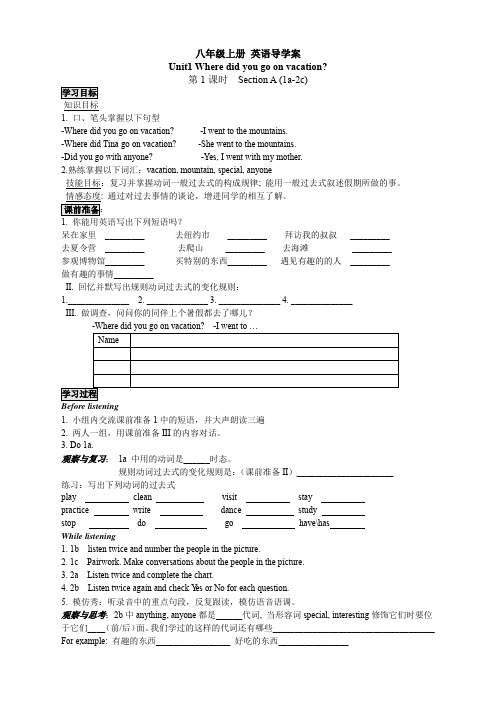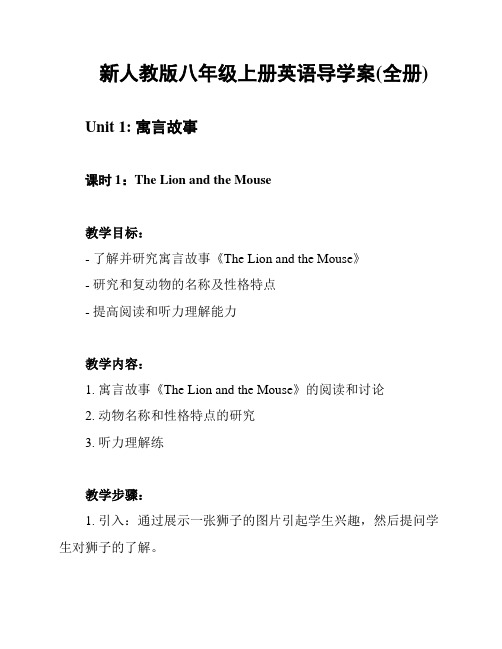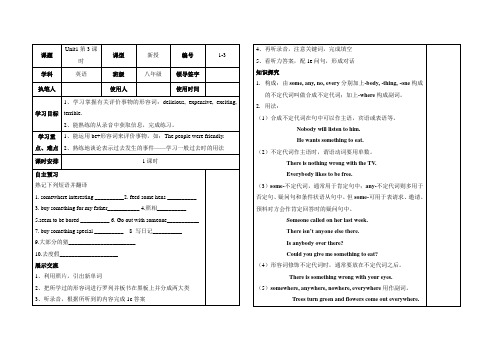2014版人教版新目标八年级上册英语 Unit 1 单元导学案
- 格式:doc
- 大小:347.00 KB
- 文档页数:23

八年级上册英语导学案Unit1 Where did you go on vacation?第1课时Section A (1a-2c)知识目标1. 口、笔头掌握以下句型-Where did you go on vacation? -I went to the mountains.-Where did Tina go on vacation? -She went to the mountains.-Did you go with anyone? -Yes, I went with my mother.2.熟练掌握以下词汇:vacation, mountain, special, anyone技能目标:复习并掌握动词一般过去式的构成规律; 能用一般过去式叙述假期所做的事。
通过对过去事情的谈论,增进同学的相互了解。
1. 你能用英语写出下列短语吗?呆在家里_________ 去纽约市_________ 拜访我的叔叔_________去夏令营_________ 去爬山_________ 去海滩_________参观博物馆_________ 买特别的东西_________ 遇见有趣的的人_________做有趣的事情_________II. 回忆并默写出规则动词过去式的变化规则:1.______________2. ______________3. ______________4. ______________III. 做调查,问问你的同伴上个暑假都去了哪儿?Before listening1. 小组内交流课前准备1中的短语,并大声朗读三遍2. 两人一组,用课前准备III的内容对话。
3. Do 1a.观察与复习:1a 中用的动词是______时态。
规则动词过去式的变化规则是:(课前准备II)______________________练习:写出下列动词的过去式While listening1. 1b listen twice and number the people in the picture.2. 1c Pairwork. Make conversations about the people in the picture.3. 2a Listen twice and complete the chart.4. 2b Listen twice again and check Yes or No for each question.5. 模仿秀:听录音中的重点句段,反复跟读,模仿语音语调。

Unit 1 Where did you go on vacation? 导学案Section A 1a—2c第1课时【学习目标】:1. Talk about past events2. To learn to use where questions and answers【学习重点】:学会用一般过去时态描述曾经度过的假日。
【学习过程】:1. 知识链接:1). 复习一般过去时态的意义与结构。
2). 掌握一些规则的和不规则动词的过去式。
2. 自主学习(教师寄语:Many hands make light work. )1) 要求学生小组讨论自己刚刚过去的暑假。
并写下用到的句型:____________________________________________________________________________ ____________________________________________________________________________ _______________________________2) 利用素材练习以上句型。
3)认读短语并将单词与图画匹配.4)小组活动Example: A: Where did Tina go on vacation?B: She went to the mountains.3. 听力练习1)Listen. Where did the people go on vacation? Complete the chart.People PlacesGraceKevinJulie2)Listen again. Check(√)Yes, I did or (×)No, I didn't for each question.4. 巩固练习According to the listening, and role-play the conversations between Grace, Kevin and Julie.Example: A: Grace, where did you go on vacation?B: I went to New York City.A: Oh, really? Did you go with anyone?B: Yes, I went with my mother.课后作业Show us your vacation. Whose vacation is the best(最棒)?【学习小结】(教师寄语:No man can do two things at once.)1. 总结一下本课时学到的动词短语。

新人教版八年级上册英语导学案(全册) Unit 1: 寓言故事课时1:The Lion and the Mouse教学目标:- 了解并研究寓言故事《The Lion and the Mouse》- 研究和复动物的名称及性格特点- 提高阅读和听力理解能力教学内容:1. 寓言故事《The Lion and the Mouse》的阅读和讨论2. 动物名称和性格特点的研究3. 听力理解练教学步骤:1. 引入:通过展示一张狮子的图片引起学生兴趣,然后提问学生对狮子的了解。
2. 阅读故事:带领学生阅读寓言故事《The Lion and the Mouse》并注重理解故事情节。
3. 讨论问题:让学生回答关于故事的问题,例如:What did the lion do to the mouse? Why did the lion spare the mouse?4. 研究动物名称和性格特点:教授单词lion、mouse等动物名称,并让学生描述它们的性格特点。
5. 听力理解练:播放与故事相关的听力材料,要求学生听并回答问题。
作业:1. 抄写故事《The Lion and the Mouse》的关键句子。
2. 阅读课本上关于动物名称和性格特点的内容并做笔记。
Unit 2: 基础篮球技巧课时1:Dribbling教学目标:- 研究和掌握篮球运球的基本技巧- 提高身体的协调能力和手眼协调能力- 培养团队合作意识和体育精神教学内容:1. 篮球运球技巧的演示和解释2. 练篮球运球的基本动作3. 小组合作练教学步骤:1. 引入:向学生展示篮球运球的动作,并解释其重要性和应用场景。
2. 演示和解释:仔细演示篮球运球的基本技巧并解释每个动作的要点。
3. 练动作:让学生跟随教师一起练篮球运球的基本动作。
4. 小组合作练:将学生分成小组,进行篮球运球的练。
每个小组轮流进行练,其他组员观察并给予反馈。
作业:1. 回顾并练篮球运球的基本动作。



学科:英语课题:Unit 1 How often do you exercise?课型:New 授课时间:第1 周执笔:审核:审批:间,多长”,对一段时间提问用它。
③how soon (过)多久(以后)”,常用于将来时态句中,对in+时间段”提问要用它。
④how far 意为距离有多远”,是指路程的 长度。
(4)exercis e ①可数名词,"练习(题);体操;(一种)运动”。
(如:do one ' s exercises ,do eye exercises )②不可数名词和动词"运动;锻炼” 。
(如:take exercise 运动,I exercise every day. 我每天锻炼。
)。
■预习反馈:认真读记以上内容,完成下列习题〖合作探究〗:■活动1:翻译并读记下列频率副词、副词短语及句子:(1) ____________ 通常______________ ⑵有时 ____________ ⑶总是 ________ ⑷从不 ⑸经 常 _________ (6)几乎不 ____________ (7)不常 __________ (8)每天 _______________ (9) 一周一次___________________ (10) 一月两次 __________________ (11)一年三次 ___________ (12)她几乎不打篮球。
_____________________ (13)他每天吃蔬菜。
__〖问题〗 ____________________________________________________________ 〖小结〗 ____________________________________________________________活动 2: 对戈卩线部分提问 :(1) Tom never exercises. ______________________(2) ______________________________________________________________ He stayed here for two weeks. _________________________________________________________(3) ______________________________________________________________ Jim will come back in an hour. __________________________________________________________ (4) ______________________________________________________________ It "s 1500 kilometers (公里)from Chongqing to Beijing. ______________________________〖问题〗 ____________________________________________________________ 〖归纳〗 ___________________________________________________________ 〖过关检测〗 用频率副词代替划线部分改写句子(解题思路举例:six times amonth f 6/30 ~ 20/100 即:sometimes ): 1. I get up at six thirty every day . month .2. Peter watches TV five times a week .3. Jim walks to schoolfour days a 4. Bob exercises once a month .6.Tom doesn 'eat apples.7 . Lucy exercises fifteen times a month . Lucy【中考链接】1.— _______ do you have an En glish party? — Once a mon th.(北京)A. How soo nB. How farC. How ofte nD. How longI get up at six thirty .Peter watches TV . Jim walks to school Bobexercises .Gi na plays tennis . Tomeats apples. exercises .ith.2. —is “ Lucky 52 ” shown o2?CCTVfery week. (20XX 年,黄冈)八年级上第1单元导学案第三课时Section B 3A—4【学习目标】1.掌握以下重点词语的用法:try, look after, better. same, as,different/differenee, maybe/may be, although=though 。
⼈教⼋年级上册英语Unit1导学案Unit 1 Where did you go on vacation?(Period1 Section A 1a-2c)【教师寄语】亲爱的同学们,新学期已经开始,新起点,新⽬标,新⾼度,你对⾃⼰有何期望?你想实现怎样的⽬标?不管过去曾有⼏多挫折和艰⾟,都让它成为过去的⼀页吧。
让我们以崭新的态度去勇敢的⾯对未来的⼀切,在耕耘的历程中,⽼师愿伴你⼀路同⾏!【⽬标导航】1. 通过对话练习:Where did you go on vacation? I went to -----Who did you go with ? I went with ----What did you do / see ? I went to / saw-----Did you have a good time ? Yes , I did No , I didn't复习回顾动词⼀般过去时态的特殊疑问句,⼀般疑问句及其肯定、否定回答。
2. 1)朗读理解本课1a部分的短语和学习⽬标的重点句型。
2)认真观察1a的图画,将词语与图⽚搭配。
3. 听录⾳完成1b , 2a , 2b .4. New words : anyone ----diary (熟读并记忆)【学习过程】预习指导1. ⾃主朗读本课时单词仔细观察单词中各字母的发⾳特点并记忆:2. 阅读学习下⾯的―语法回顾‖,然后朗读句型互检查⾃学的内容发现不会的马上交流探讨。
【巩固提升】⼩组合作练习对话并展⽰。
⽤英语询问你的⼀位好朋友,她(他)假期去了哪⾥?看到了什么?A: Where did you go…?B: I went to…A: Did you see…B: Yes, I did. / No, I didn’t.【课堂检测】⼀、单选。
( ) 1. She watered the flowers ________.A tomorrowB sometimesC yesterday morning( ) 2.What ____ Mike do last weekend ?A doB doesC did( ) 3. I often help my mother _____ housework.A doesB didC do( ) 4. _____ you _____ TV last night ?A Do, watchB Did, watchC Did, watched( ) 5.They _____ on a trip in February ,2007.A are goingB goingC went( ) 6.----Good afternoon, Miss Lee. How does Mike feel?-----He’s tired . He ____ a lot of work ______ .A does , this morningB do , this morningC did , this moring⼆、适当形式填空。
人教新目标英语八年级上册Unit 1 Where did you go on vacation? (period 4 writing)一.日积月累(宝剑锋自磨砺出)1.I arrived in Penang in Maleysia this morning with my family. 今天早上我和我的家人抵达了马来西亚。
句型总结:主语+arrived in+地点+时间+with+人佳句仿写:我和我朋友们昨天下午到达了北京。
2.It was sunny and hot . 天气晴朗而炎热。
描写天气的形容词还有:________________________________________________________. 佳句仿写:_________________________________________.3.I felt like I was a bird. 我感觉自己就像一只鸟。
(比喻句)feel like +名词/句子,感受到,给...的感觉佳句仿写:________________________________________________________4.For lunch, we had something very special.午餐我们吃了一些特别的东西。
不定代词+ 形容词佳句仿写:晚餐我们吃了一些美味的东西。
__________________________________________.5.I like this place because I learned something important. 我喜欢这个地方因为我学到了一些重要的东西。
不定代词+ 形容词佳句仿写:我喜欢这本书因为我看到一些有趣的东西。
___________________________________________________.二.厚积薄发:列提纲(自己完成额!)1.Where:2.Who:3.How/weather4.What /do5.What/food6.How/ feel三.小试牛刀:Write a travel diary by using your notes above. 利用上面的提纲写一篇旅行日记。
第1单元Where did you go on vacation?Section A 单词anyone pron.任何人anywhere adv.在任何地方wonderful adj.精彩的;绝妙的few adj.&pron.不多;很少most adj.,adv.&pron.最多;大多数something pron.某事;某物nothing pron.没有什么;没有一件东西everyone pron.每人;人人;所有人myself pron.我自己;我本人yourself pron.你自己;您自己hen n.母鸡pig n.猪seem v.好像;似乎;看来bored adj.厌倦的;烦闷的someone pron.某人diary n.日记;记事簿短语go on vacation去度假anything special什么特别的stay at home待在家里have a good time玩得开心quite a few相当多;不少of course当然;自然句型1.—Did you go out with anyone? 你和别人一起出去的吗?—No. No one was here. Everyone was on vacation.不。
没有人在这里。
大家都去度假了。
2.—How was the food? 食物怎么样?—Everything tasted really good! 每样东西尝起来都很美味!Section B 单词activity n.活动enjoyable adj.有乐趣的;令人愉快的decide v.决定;选定try v.& n.尝试;设法;努力bird n.鸟bicycle n.自行车;脚踏车building n.建筑物;房子trader n.商人wonder v.想知道;琢磨difference n.差别;差异top n.顶部;表面wait v.等待;等候umbrella n.伞;雨伞wet adj.湿的;潮湿的;下雨的duck n.鸭below prep.&adv.在……下面;到……下面hungry adj.饥饿的as adv.像……一样;如同conj.当……时;如同hill n.小山;山丘dislike v.&n.不喜爱(的事物);厌恶(的事物)enough adj.&adv.足够的(地);充足的(地);充分的(地)短语feel like给……的感觉;感受到because of因为arrive in到达 a lot of许多;大量的take some photos拍一些照片too many太多句型1.There are a lot of new buildings now, but many of the old buildings are still there. 现在那里有许多新的建筑物,但是许多老式的建筑物还在那里。